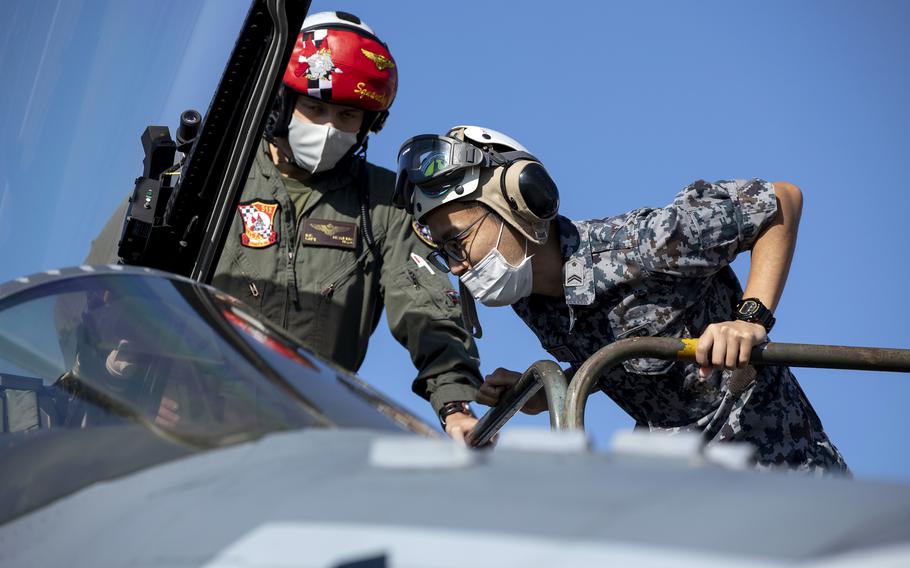
Marine Corps Capt. Reagan Reynolds, a pilot with Marine Fighter Attack Squadron 312, shows the cockpit of an F/A-18C Hornet to Japan Air Self-Defense Force Technical Sgt. Nozaki during exercise Keen Sword at Nyutabaru Air Base, Japan, Nov. 16, 2022. (Jackson Ricker/U.S. Marine Corps)
TOKYO – People in Japan are warming to the idea of a stronger defense policy amid challenges from China, Russia and North Korea, according to a recent poll.
The Nikkei Research survey of 1,663 Japanese adults between October and November showed 49% backed an expanded role in the U.S.-Japan alliance while 46% opposed it.
That’s up from 41% who wanted a bigger role for Japan in the alliance and 53% who were against it in 2020. A 2021 survey showed 46% in favor and 49% against, the Nikkei newspaper reported Jan. 25.
When people were asked if they were worried Japan might be attacked, 83% said they were concerned while 14% said they weren’t. Of those concerned, 54% said Japan should boost its role in the U.S.-Japan alliance, according to the poll.
North Korean and Chinese missile launches near Japan and Russia’s invasion of Ukraine kept security issues in the news last year.
In the latest poll, 89% of respondents saw China as a threat, 87% felt threatened by North Korea, and 90% saw Russia as a threat.
A defense budget totaling $51.4 billion, Japan’s largest ever, was approved by the country’s Cabinet in December. It includes $1.59 billion to acquire U.S. Tomahawk missiles and $963 million to develop and manufacture improved surface-to-ship guided missiles.
That month, Japan’s government said it was seeking counterstrike capabilities that would target launch sites on enemy territory.
The Nikkei poll may encourage some otherwise fainthearted politicians and bureaucrats to support boosting Japan’s defense capabilities, according to retired Marine Col. Grant Newsham, a senior researcher with the Japan Forum for Strategic Studies in Tokyo.
In recent years, Japan’s public has had a better sense of what’s needed to defend their nation than the country’s ruling class, he said in an email Monday.
“As for Japan doing more in the US-Japan alliance: it’s about time,” he said.
The Nikkei Research poll shows public support for a more forward leaning defense policy, agreed Brad Glosserman, deputy director and visiting professor at the Center for Rule-Making Strategies at Tama University in Tokyo.
“In the past the government might have used negative figures — the old (poll) numbers - to fend off US demands for more activism by Japan, but no longer,” he said in an email Monday.
A problem is that the poll doesn’t address support for spending more on defense, which doesn’t appear to have public support, Glosserman said.
Tokyo and Washington will welcome the poll results, James Brown, an international affairs expert at Temple University’s Japan campus, said in an email the same day.
“[Japan’s ruling political party] has been steadily leading Japan towards a position in which it can make a larger contribution to the alliance,” he said. “A big step in that direction was the reinterpretation of the constitution to permit collective self-defense. At the time, that change provoked large public protests. Now it seems most of the public is on board and is willing for the government to go further. The government has led, and the public is following.”